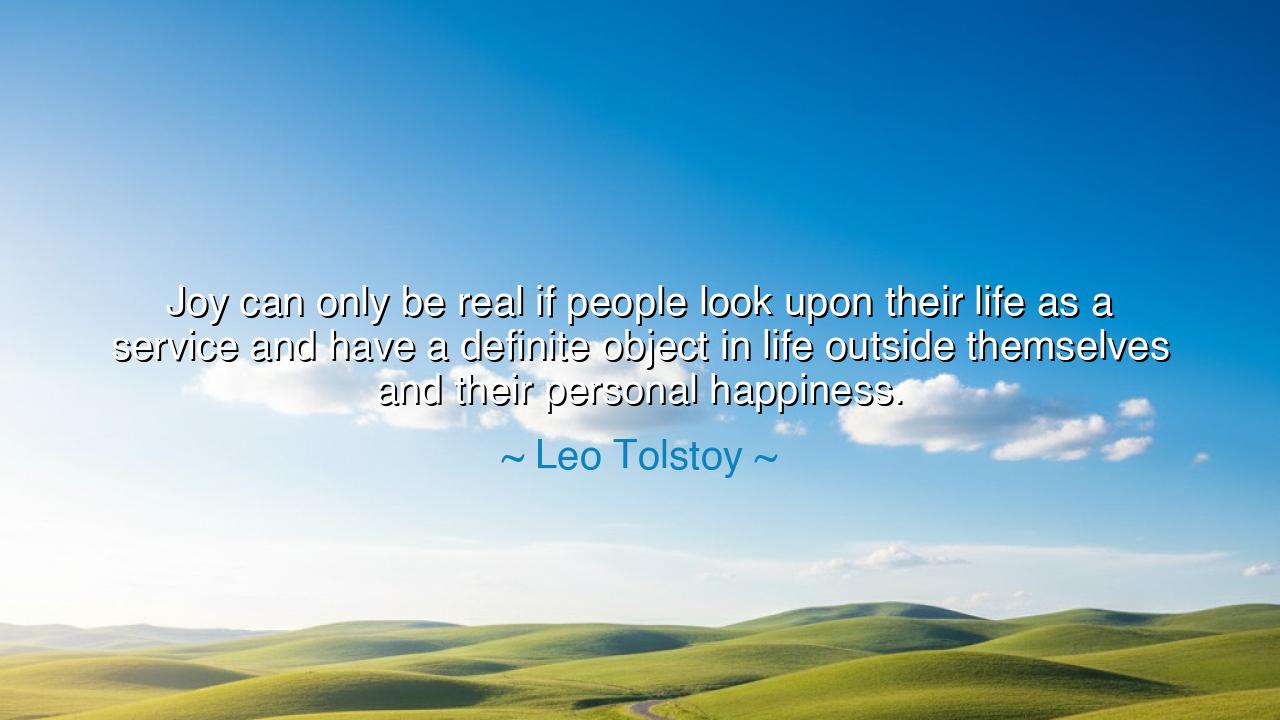
Joy can only be real if people look upon their life as a service
Joy can only be real if people look upon their life as a service and have a definite object in life outside themselves and their personal happiness.






“Joy can only be real if people look upon their life as a service and have a definite object in life outside themselves and their personal happiness.” Thus spoke Leo Tolstoy, the great soul of Russia, whose heart wrestled with the deepest questions of existence and emerged illumined by truth. In this saying, he unveils a wisdom as old as time — that true joy cannot be found in self-centered desire, nor in the pursuit of pleasure for its own sake. It can only be born when one’s life is given to something greater than the self — to service, to purpose, to the sacred labor of love for others.
The origin of these words lies in the later years of Tolstoy’s life, when the author of War and Peace and Anna Karenina, having tasted wealth, fame, and worldly success, found himself in despair. He had everything men dream of, yet felt no peace within. His soul was restless, tormented by the emptiness of a life lived for the self. In his spiritual crisis, Tolstoy came to see that happiness pursued as an end always fades into dust, but happiness discovered through selfless living becomes eternal. Out of this revelation was born his teaching — that man’s greatest fulfillment lies not in possessing, but in serving, not in pleasure, but in purpose.
When he says that “joy can only be real if people look upon their life as a service,” Tolstoy calls us to the higher law of the human spirit — the law of giving. He teaches that life’s meaning is not to be found within the narrow walls of personal comfort, but in the open fields of compassion and contribution. To serve is not to lose oneself, but to find oneself anew. For it is in helping others, in lifting burdens not our own, that the soul discovers the purest kind of happiness — a joy untainted by fear or vanity. This is the joy of the mother who labors for her child, of the teacher who sows wisdom, of the healer who mends the broken, of the artist who creates not for glory, but for truth.
Consider the life of Florence Nightingale, who left behind wealth and privilege to serve the wounded in the grim hospitals of war. Amid filth, blood, and exhaustion, she found a radiance that no luxury could match. Her joy was not pleasure — it was purpose. The light she carried into the sickrooms became a symbol of the divine joy that comes when one gives wholly to others. Tolstoy himself, inspired by such figures, realized that all lasting happiness shares this root: that it must reach beyond the self, stretching toward love, duty, and service to humanity.
When Tolstoy speaks of having “a definite object in life outside themselves,” he means that man must live not by whim, but by calling. To drift without aim is to wither; to live only for oneself is to perish inwardly, even while breathing. But to dedicate oneself to a goal greater than one’s own comfort — whether it be justice, truth, beauty, or kindness — is to awaken the immortal part of the soul. For in striving toward the good of all, the individual becomes an instrument of the divine. Life gains weight, meaning, and direction. Then every act, no matter how small, becomes sacred — every day becomes a hymn to service.
There is a paradox here: the more we seek personal happiness, the less we find it. Like water grasped too tightly in the hand, it slips away. But when we forget the self — when we give, when we build, when we love — joy returns to us, freely, abundantly, quietly. The ancients knew this. The Buddha called it “the path of compassion,” and Christ said, “He who loses his life shall find it.” Tolstoy, through his own anguish and awakening, rediscovered this ancient truth and offered it to the modern soul lost in the pursuit of pleasure.
So, dear seeker, take this wisdom into your heart: make your life a service, and joy will follow like a shadow that never leaves. Find your object outside yourself — some good, some truth, some kindness that uplifts others — and give yourself to it. Let your work, your words, your love become offerings to life itself. Do not chase happiness; create meaning, and happiness will find you.
For as Leo Tolstoy teaches, real joy is not a thing to be earned or bought, but a light kindled in the soul when one begins to live for something beyond the self. It is the joy of purpose, the peace of conscience, the quiet triumph of love that endures when all else fades. Serve, therefore, with courage and humility — for in the service of others, you will meet not only joy, but God Himself.






AAdministratorAdministrator
Welcome, honored guests. Please leave a comment, we will respond soon